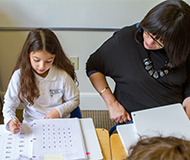Titles, Leadership, and Managing Expectations in a Time of Urgent Action
 This month I have been collecting titles - not for myself, but in the field. During my visits to schools, I have started a list of unique roles that schools have created, which speak to a real need, a real talent and set us up for authentic and elevated expectations. It strikes me that there are so many kinds of leadership - and as we hope to nurture and inspire students to become teachers, and teachers to become school leaders, I am struck by a lesson which we seem to be learning now that we did not learn in the time of the Maccabim. The Kohanim had a role in leadership - a very important, crucial role. And the tribe of Yehuda had their roles as kings. But there was no trust - and when the Kohanim bravely won the war for us, they held onto their power. They were meant to step back into their role as spiritual leaders and make room for the Kings from the tribe of Yehuda to take over, but they did not… and Chazal have not let us forget it. I wonder to myself, though, what options did they have? What could they have done realistically? If the Kings of Yehuda had disappointed before, what option did they have?
This month I have been collecting titles - not for myself, but in the field. During my visits to schools, I have started a list of unique roles that schools have created, which speak to a real need, a real talent and set us up for authentic and elevated expectations. It strikes me that there are so many kinds of leadership - and as we hope to nurture and inspire students to become teachers, and teachers to become school leaders, I am struck by a lesson which we seem to be learning now that we did not learn in the time of the Maccabim. The Kohanim had a role in leadership - a very important, crucial role. And the tribe of Yehuda had their roles as kings. But there was no trust - and when the Kohanim bravely won the war for us, they held onto their power. They were meant to step back into their role as spiritual leaders and make room for the Kings from the tribe of Yehuda to take over, but they did not… and Chazal have not let us forget it. I wonder to myself, though, what options did they have? What could they have done realistically? If the Kings of Yehuda had disappointed before, what option did they have?
The answer, perhaps, is a bit of creativity. A bit of “what if…” A bit of what I have been seeing in so many schools….
For example:
- In one lower school I visited, they saw a huge need for middot, social emotional learning and processing during those “in-between” times like lunch and recess, so they created a role called Director of Campus Life, whose role, among other things, was to apply the language from Responsive Classroom to those in-between times, when there is no formal class or curriculum, but is where the values we are teaching are lived.
- One Middle School has a Coordinator of Student Development - a role that includes religious guidance (like a mashgiach ruchani) as well as social emotional components. This person works with the guidance team and teachers to help see the whole child.
- In one high school there are two symbiotic roles in the administrative team: Dean of Faculty and Dean of Students. These two professionals work together to ensure that students are excelling, while teachers are excelling - both getting the support and guidance needed.
- Here is a really new idea: Content and Context Experts: This role is for educational leaders who oversee curriculum, knowing and understanding that context changes everything, so they must learn, not only the content and best practices, but also understand the context of each class including the teacher and students.
- And since language matters- I notice that many schools now call their learning specialists Academic Counselors of Coaches.They are not only helping great learning happen for students with varied abilities, they are Learning Coaches-- what a difference words make!
 The creativity I am seeing inspires me in so many ways. Not only because it is thrilling to see devoted educators always learning and growing and expanding their skills to serve our students even more, but also because the creativity our leaders are showing reflects an understanding that words matter, and perhaps titles should be more transparent and inspiring. Perhaps, unlike the Macabim who were afraid to step away and consider new options, we will leverage their bravery but apply it to thinking about how we can get the right people into the right roles to lead our people.
The creativity I am seeing inspires me in so many ways. Not only because it is thrilling to see devoted educators always learning and growing and expanding their skills to serve our students even more, but also because the creativity our leaders are showing reflects an understanding that words matter, and perhaps titles should be more transparent and inspiring. Perhaps, unlike the Macabim who were afraid to step away and consider new options, we will leverage their bravery but apply it to thinking about how we can get the right people into the right roles to lead our people.



